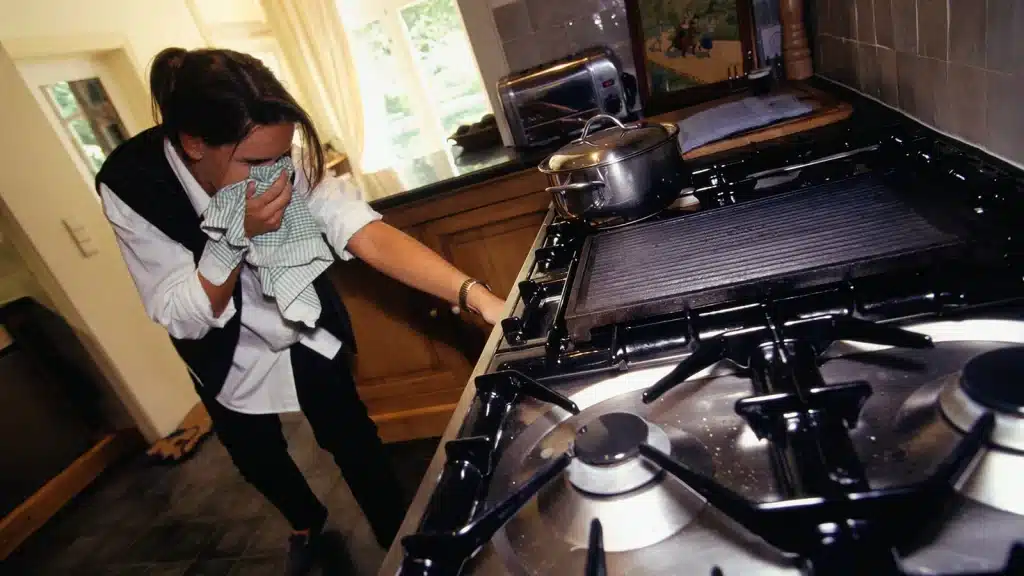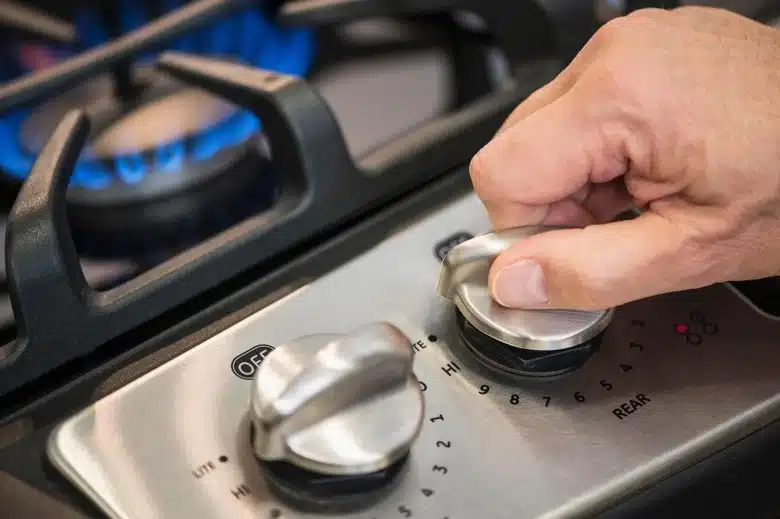Leaving a gas stove on for an extended period is dangerous. Even without a flame, gas can leak and create a highly flammable environment, leading to the risk of an explosion or fire. This article will explore the dangers of leaving your gas stove on for a week, the risks involved, and what to do if it happens.
Table of Contents
The Dangers of Leaving a Gas Stove On for an Extended Period
Leaving a gas stove on for a week, even without a flame, can result in significant hazards. Gas is flammable, and when left unattended, it can build up and create an explosive atmosphere. A small spark or static electricity can ignite the gas, leading to fires or explosions. Gas stoves should never be left on for long periods, and safety measures must always be followed.
Why is Gas So Dangerous?
Gas, including natural gas and propane, is highly flammable because of its methane content. Methane burns easily when exposed to oxygen. A gas leak occurs when gas escapes from the stove or pipe, which can be dangerous if allowed to accumulate in an enclosed area. The gas is odorless by itself, but an odorant like sulfur is added to help detect leaks. In a confined space, the gas can quickly reach an explosive concentration.

How Long is it Safe to Leave a Gas Stove On?
Gas stoves should never be left on for extended periods. The longer the gas remains on, the higher the risk of leaks and potential explosion. Even after just a few hours of being on, a stove can cause issues.
Short-Term Risks (Minutes to Hours)
If left on for only a short time, the stove will use gas more quickly, leading to waste and unnecessary energy consumption. However, the primary risk is still gas accumulation in the air, particularly in poorly ventilated spaces.
Long-Term Risks (Several Hours to Days)
If the stove is left on for several hours or even days, the risk of gas buildup increases exponentially. A significant concentration of gas can gather in a room, and an unnoticed spark could ignite it. This is why it’s critical to turn off your gas stove immediately after cooking.
What Happens After a Week of Gas Being Left On?
Leaving your gas stove on for a week is highly dangerous. Gas will continue to leak from the burner and accumulate in the room. In this case, there is a severe risk of explosion or fire. A simple action like turning on a light or opening a door could create a spark that ignites the gas, leading to potential destruction of property or harm to individuals.
What Should You Do If You Forget to Turn Off the Gas?
If you leave your gas stove on by accident, here’s what you should do:

Step 1: Turn Off the Gas Supply Immediately
The first and most crucial action is to turn off the gas valve to stop the gas from leaking further. If you are unsure where the gas valve is, locate it immediately to prevent further risks.
Step 2: Ventilate the Area
Open windows and doors to allow the gas to escape from the room. This can help reduce the concentration of gas in the air.
Step 3: Check for Gas Leaks
If you suspect a gas leak, check the pipes, burners, and surrounding areas with a soapy water solution. If you see bubbles forming, you have a gas leak. In that case, immediately evacuate the house and call the gas company or emergency services.
What to Do If You Smell Gas?
If you detect the smell of gas, don’t ignore it. Here’s how to respond quickly:
- Turn off the stove – Do not turn on any lights or use appliances to avoid a spark.
- Open windows – Ventilate the area to help disperse the gas.
- Evacuate – Leave the area to avoid exposure to toxic gas.
- Call Emergency Services – Contact the gas company or emergency responders to address the leak.
Can a Gas Stove Cause Carbon Monoxide Poisoning?
Yes, if a gas stove is left on without proper ventilation, it can produce carbon monoxide (CO), a colorless, odorless gas that can be fatal in high concentrations. This is especially true if the burner is not burning gas completely, which can happen when the stove is left on for an extended period.
The Risk of Explosion from Gas Accumulation
As gas accumulates in an enclosed space, the risk of explosion grows. If a significant concentration of gas gathers in the room, it can ignite from the smallest spark. The explosion can cause severe damage to the house, harm to individuals, and even fatalities. This is why gas stoves should never be left on for prolonged periods without supervision.
How to Prevent Leaving Your Gas Stove On?
The best way to prevent leaving your gas stove on and causing a dangerous situation is through the following methods:
1. Use Timers
Set a timer for cooking to remind you when to turn off the stove. Many smart stoves have built-in timers that automatically shut the burner off after a set time.
2. Install a Gas Shut-Off Valve
Installing an automatic gas shut-off valve can help prevent accidents. This device will turn off the gas supply if it detects that the stove has been on for too long.
3. Use Smart Technology
Smart stoves and gas detectors are available that can alert you when the stove is left on for too long. These devices can send notifications to your smartphone, allowing you to act quickly if you forget.
Related Articles:
Is It Safe to Put a Lid on the Stove While Cooking?
Why does gas stove have 2 different types of burners? 2024
Can an Indoor Gas Cooktop Be Used Outside? Latest Info 2024
Conclusion
Leaving a gas stove on for a week is incredibly dangerous. It leads to the risk of gas leaks, explosions, and carbon monoxide poisoning. Always turn off your stove after use, and if you forget, follow the steps to ensure safety. Prevent accidents by installing smart technology and automatic shut-off valves for added security.
FAQs
What happens if I leave my gas stove on without a flame?
Leaving the stove on without a flame causes gas to leak into the air, creating an explosion hazard. Always check that the flame is on when using the stove.
Can a gas stove cause a fire if left on?
Yes, if the stove is left on for too long and gas accumulates, a spark can ignite the gas, leading to a fire.
How can I detect a gas leak?
You can detect a gas leak using a soapy water solution around the gas line. If bubbles form, there’s a leak.
Can smart technology help prevent leaving the stove on?
Yes, some smart stoves have sensors that will alert you if the stove is left on for too long, providing extra safety.
How can I safely store gas when not in use?
Always turn off the gas supply to prevent leaks. Additionally, ensure proper ventilation in your kitchen.




